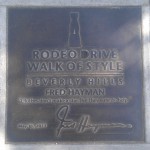Napoleon Hill, W. Clement Stone, and Me
Posted on August 21, 2018 by Robert Ringer
It’s amazing how some books continue to sell forty, fifty, even a hundred years after they were first published. In the field of personal development, the champion in this regard is undoubtedly Think and Grow Rich, by Napoleon Hill. The book was first published in 1937 and has gone through many iterations since then.
In my ongoing quest to rid my life of thousands of old press clippings, articles, souvenirs, etc., the other day I happened across my dog-eared copy of Think and Grow Rich, which was personally signed by Napoleon Hill.
I vividly remember having a brief chat with Hill when I visited The Napoleon Hill Foundation in Columbia, South Carolina back in the sixties. The purpose of my visit was to learn more about The Science of Personal Achievement, a course his foundation was marketing at the time. Hill was kind of a crusty old guy, definitely not overly friendly or warm.
By that time, W. Clement Stone, a wealthy insurance magnate who had risen from the ranks of poverty despite having no formal education, had become Hill’s benefactor, so to speak, and had collaborated with him on a number of other books and projects. Unlike Napoleon Hill, he was a very friendly, gracious man, which is undoubtedly one of the reasons why he was such a great salesman.
Mr. Stone was kind enough to meet with me for an hour or so in his suite at the New York Hilton Midtown on his way back from Europe. Being the energetic young entrepreneur that I was, I had relentlessly tracked him down through his secretary and was excited when she called me back and said that Mr. Stone would be delighted to meet with me in New York on his way back to Chicago.
On reflection, I can’t imagine why a man of Stone’s stature would take the time to meet with a kid in his twenties, but it serves as a reminder to me that having the chutzpah to ask is one of the most powerful tools a young entrepreneur has at his disposal.
I still remember how impressed I was when I walked into W. Clement Stone’s majestic suite at the Hilton Hotel. I have no recollection of what we discussed, but I clearly remember that his wife sat in on the meeting and that she, too, was very pleasant. While there, I had Stone sign the same copy of Think and Grow Rich that Napoleon Hill had signed when I was in South Carolina, so today I have a genuine heirloom that contains both men’s signatures.
When I was in Columbia, I also met Dr. Sidney Bremer, whom I believe was the president of The Napoleon Hill Foundation at the time. Like W. Clement Stone, Bremer was a congenial and cordial man, and we talked at length at least two or three times during my visit.
Looking at my copy of Think and Grow Rich, and the signatures of Messrs. Hill and Stone, got me thinking about all that has transpired since that time. In those days, I was going from one entrepreneurial venture to another, and hadn’t yet gone into the real estate brokerage business let alone written a book about my experiences in that field.
As they have a habit of doing, the years rolled by, Napoleon Hill passed away in 1970, and, lo and behold, the relentless young kid who had visited with Napoleon Hill, Sidney Bremer, and W. Clement Stone had become a New York Times bestselling author. Then, in 1976, Fawcett Books, my paperback publisher for Winning Through Intimidation, held a cocktail party in my honor at the American Booksellers Association Convention in Chicago.
While exchanging pleasantries with guests, a familiar looking face approached me, hand extended, and introduced himself. It was Sidney Bremer. I was amazed that he remembered me, and we enjoyed a nice chat together. “Small world,” I thought to myself.
To this day, I have no idea what Dr. Bremer was doing at a Fawcett Books cocktail party for Robert Ringer. And, sadly, I never had another opportunity to ask him, because he passed away just four years later.
Funny thing, but today, for the first time, it occurred to me that in all my numerous trips to Chicago over the years, I never made an attempt to contact W. Clement Stone again. I now wish I had, because I think he would have remembered our hour-long meeting at the New York Hilton back in the mid-sixties and probably would have gotten a big kick out of how far I had come since that time.
Clement Stone passed away in 2002, shortly after his one hundredth birthday. What a great life he must have had — the archetypal Horatio Alger story. I wish I had gotten to know him better and perhaps been able to pick his brain from time to time.
As to Think and Grow Rich, though it had a big impact on my thinking while in my twenties, it lost much of its appeal for me when I tried to reread it on several occasions over the years. Each time I delved into it, Hill’s writing style, as well as much of his advice and many of his aphorisms, seemed somewhat banal and specious.
Being fair to the man, however, the year 1937 was another time, and the world was much younger than today. In those days, men wore topcoats and ties to baseball and football games, no one had ever heard of “women’s reproductive rights,” and being gay meant that a person was happy.
Thinking about all this made me a bit nostalgic, and as I look back over the decades I realize I was so caught up in my own career that I rarely made time to touch base with the many interesting people whose paths crossed with mine. There’s no question about it, youth really is wasted on the young. Too bad we can’t go back in time, armed with the knowledge and wisdom we possess today, and take the time to do the things that really matter.










